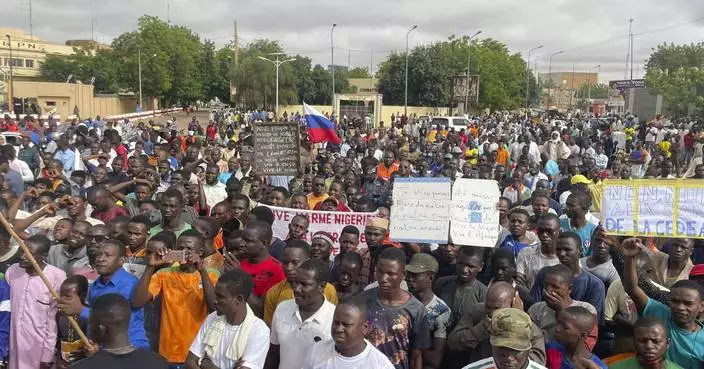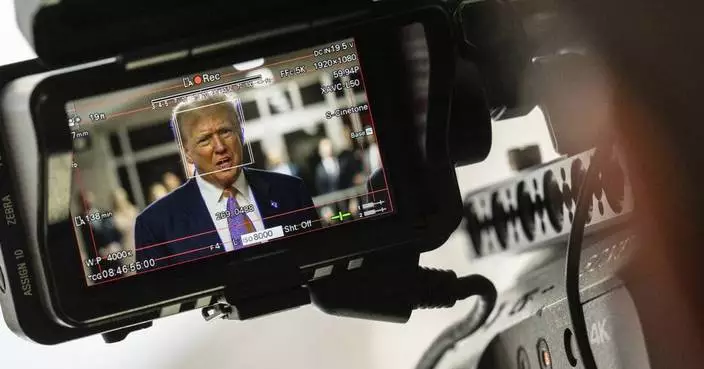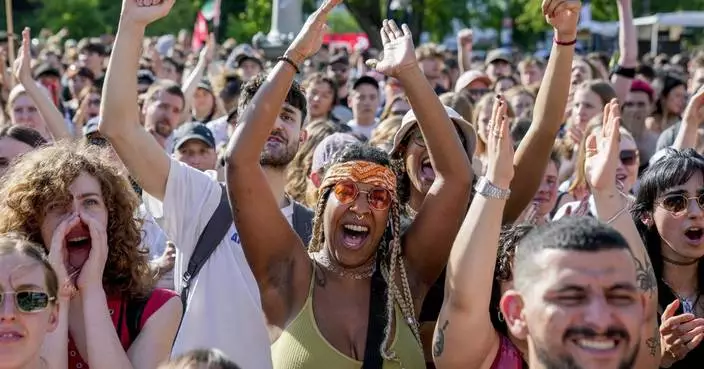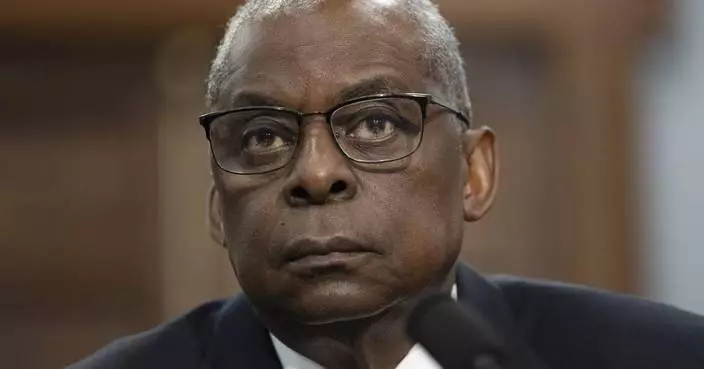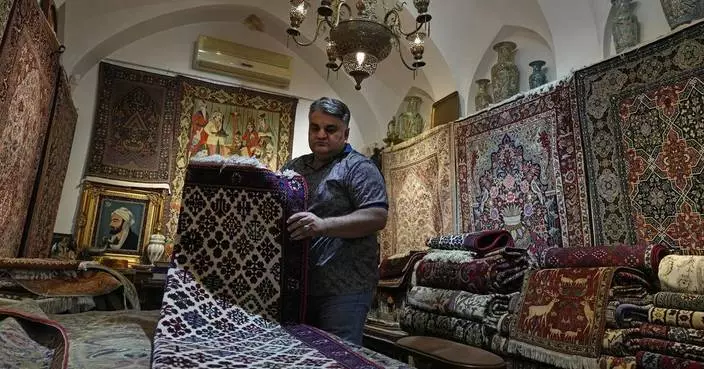Two months before special counsel Robert Mueller was appointed in the spring of 2017, President Donald Trump picked up the phone and called the head of the largest U.S. intelligence agency. Trump told Mike Rogers, director of the National Security Agency, that news stories alleging that Trump's 2016 White House campaign had ties to Russia were false and the president asked whether Rogers could do anything to counter them.
Rogers and his deputy Richard Ledgett, who was present for the call, were taken aback.
Afterward, Ledgett wrote a memo about the conversation and Trump's request. He and Rogers signed it and stashed it in a safe. Ledgett said it was the "most unusual thing he had experienced in 40 years of government service."
Trump's outreach to Rogers, who retired last year, and other top intelligence officials stands in sharp contrast to his public, combative stance toward his intelligence agencies. At the time of the call, Trump was just some 60 days into his presidency, but he already had managed to alienate large parts of the intelligence apparatus with comments denigrating the profession.
Since then, Trump only has dug in. He said at a news conference in Helsinki after his 2017 summit with Russian leader Vladimir Putin that he gave weight to Putin's denial that Russia meddled in the 2016 election, despite the firm conclusion of U.S. intelligence agencies that it had. "I don't see any reason why it would be" Russia, Trump said. And earlier this year, Trump called national security assessments "naive," tweeting "perhaps intelligence should go back to school."
Yet in moments of concern as Mueller's investigation into Russian interference in the 2016 election got underway, Trump turned to his spy chiefs for help.
The phone call to Rogers on March 26, 2017, came only weeks after then-Attorney General Jeff Sessions had angered Trump by stepping aside from the investigation. James Comey, the FBI director who would be fired that May, had just told Congress that the FBI was not only investigating Russian meddling in the election, but also possible links or coordination between Moscow and the Trump campaign.
The call to Rogers and others like it were uncovered by Mueller as he investigated possible obstruction. In his 448-page report released Thursday, Mueller concluded that while Trump attempted to seize control of the Russia investigation and bring it to a halt, the president was ultimately thwarted by those around him.
The special counsel said the evidence did not establish that Trump asked or directed intelligence officials to "stop or interfere with the FBI's Russia investigation." The requests to those officials, Mueller said, "were not interpreted by the officials who received them as directives to improperly interfere with the investigation."
During the call to Rogers, the president "expressed frustration with the Russia investigation, saying that it made relations with the Russians difficult," according to the report.
Trump said news stories linking him with Russia were not true and he asked Rogers "if he could do anything to refute the stories." Even though Rogers signed the memo about the conversation and put it in a safe, he told investigators he did not think Trump was giving him an order.
Trump made a number of similar requests of other top intelligence officials.
On March 22, 2017, Trump asked then-CIA Director Mike Pompeo and National Intelligence Director Dan Coats to stay behind after a meeting at the White House to ask if the men could "say publicly that no link existed between him and Russia," the report said.
In two other instances, the president began meetings to discuss sensitive intelligence matters by stating he hoped a media statement could be issued saying there was no collusion with Russia.
After Trump repeatedly brought up the Russia investigation with his national intelligence director, "Coats said he finally told the President that Coats's job was to provide intelligence and not get involved in investigations," the report said.
Pompeo recalled that Trump regularly urged officials to get the word out that he had not done anything wrong related to Russia. But Pompeo, now secretary of state, said he had no recollection of being asked to stay behind after the March 22 meeting, according to the report.
Coats told Mueller's investigators that Trump never asked him to speak with Comey about the FBI investigation. But other employees within Coats' office had different recollections of how Coats described the meeting immediately after it occurred.
According to the report, senior staffer Michael Dempsey "said that Coats described the president's comments as falling 'somewhere between musing about hating the investigation' and wanting Coats to 'do something to stop it.' Dempsey said Coats made it clear that he would not get involved with an ongoing FBI investigation."
For complete coverage of the Mueller report, go to https://www.apnews.com/TrumpInvestigations
WASHINGTON (AP) — Israel this week briefed Biden administration officials on a plan to evacuate Palestinian civilians ahead of a potential operation in the southern Gaza city of Rafah aimed at rooting out Hamas militants, according to U.S. officials familiar with the talks.
The officials, who were not authorized to comment publicly and requested anonymity to speak about the sensitive exchange, said that the plan detailed by the Israelis did not change the U.S. administration’s view that moving forward with an operation in Rafah would put too many innocent Palestinian civilians at risk.
Israeli Prime Minister Benjamin Netanyahu has vowed to carry out a military operation in Rafah despite warnings from President Joe Biden and other western officials that doing so would result in more civilian deaths and worsen an already dire humanitarian crisis.
The Biden administration has said there could be consequences for Israel should it move forward with the operation without a credible plan to safeguard civilians.
“Absent such a plan, we can’t support a major military operation going into Rafah because the damage it would do is beyond what’s acceptable,” U.S. Secretary of State Antony Blinken said late Friday at the Sedona Forum, an event in Arizona hosted by the McCain Institute.
Some 1.5 million Palestinians have sheltered in the southern Gaza city as the territory has been ravaged by the war that began on Oct. 7 after Hamas militants attacked Israel, killing 1,200 people and taking about 250 hostages.
The United Nations humanitarian aid agency on Friday said that hundreds of thousands of people would be “at imminent risk of death” if Israel moves forward with the Rafah assault. The border city is a critical entry point for humanitarian aid and is filled with displaced Palestinians, many in densely packed tent camps.
The officials added that the evacuation plan that the Israelis briefed was not finalized and both sides agreed to keep discussing the matter.
White House press secretary Karine Jean-Pierre told reporters on Friday that no “comprehensive” plan for a potential Rafah operation has been revealed by the Israelis to the White House. The operation, however, has been discussed during recent calls between Biden and Netanyahu as well as during recent virtual talks with top Israeli and U.S. national security officials.
“We want to make sure that those conversations continue because it is important to protect those Palestinian lives — those innocent lives,” Jean-Pierre said.
The revelation of Israel's continued push to carry out a Rafah operation came as CIA director William Burns arrived Friday in Egypt, where negotiators are trying to seal a cease-fire accord between Israel and Hamas.
Hamas is considering the latest proposal for a cease-fire and hostage release put forward by U.S., Egyptian and Qatari mediators, who are looking to avert the Rafah operation.
They have publicly pressed Hamas to accept the terms of the deal that would lead to an extended cease-fire and an exchange of Israeli hostages taken captive on Oct. 7 and Palestinian prisoners in Israeli jails.
Hamas has said it will send a delegation to Cairo in the coming days for further discussions on the offer, though it has not specified when.
Israel, and its allies, have sought to increase pressure on Hamas on the hostage negotiation. Signaling that Israel continues to move forward with its planning for a Rafah operation could be a tactic to nudge the militants to finalize the deal.
Netanyahu said earlier this week that Israeli forces would enter Rafah, which Israel says is Hamas’ last stronghold, regardless of whether a truce-for-hostages deal is struck. His comments appeared to be meant to appease his nationalist governing partners, and it was not clear whether they would have any bearing on any emerging deal with Hamas.
Blinken visited the region, including Israel, this week and called the latest proposal “extraordinarily generous” and said “the time to act is now.”
In Arizona on Friday, Blinken repeated remarks he made earlier this week that "the only thing standing between the people of Gaza and a cease-fire is Hamas.”
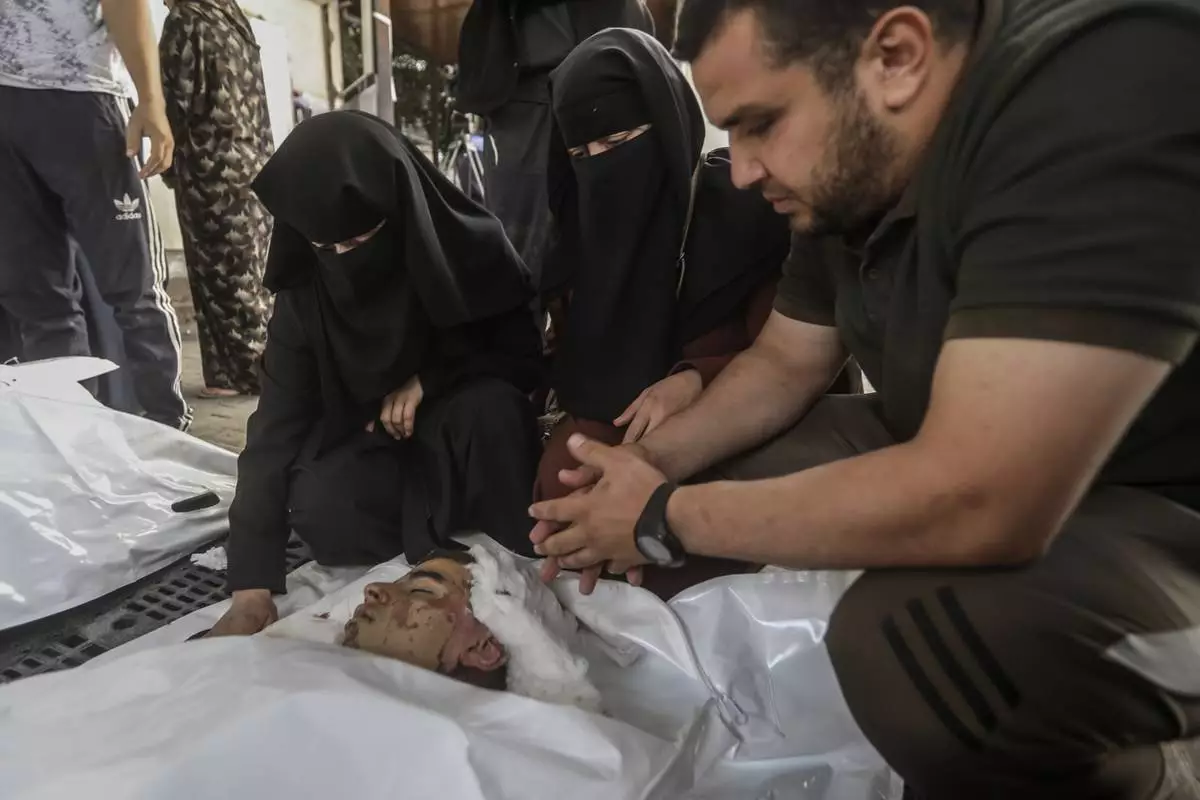
The Chahine family prepares to bury two adults and five boys and girls under the age of 16 after an overnight Israeli strike in Rafah, southern Gaza Strip, Friday, May 3, 2024. An Israeli strike on the city of Rafah on the southern edge of the Gaza Strip killed several people, including children, hospital officials said Friday. (AP Photo/Ismael Abu Dayyah)
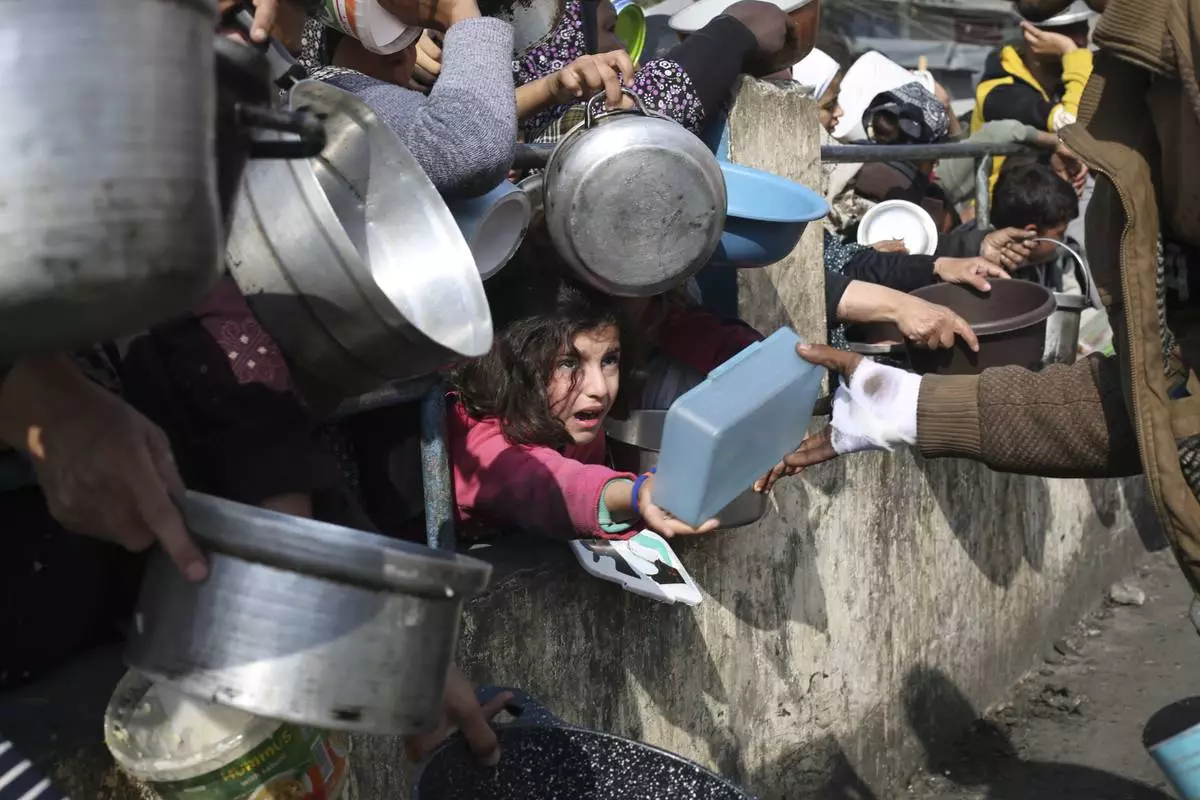
FILE - Palestinians line up for free food during the ongoing Israeli air and ground offensive on the Gaza Strip in Rafah, Jan. 9, 2024. A top U.N. official said Friday, May 3, 2024, that hard-hit northern Gaza was now in “full-blown famine" after more than six months of war between Israel and Hamas and severe Israeli restrictions on food deliveries to the Palestinian territory. (AP Photo/Hatem Ali, File)

Palestinians rescue a woman survived after the Israeli bombardment on a residential building of Abu Alenan family in Rafah, southern Gaza Strip, early Saturday, May 4, 2024. (AP Photo/Ismael Abu Dayyah)

President Joe Biden walks across the South Lawn of the White House as he talks with White House press secretary Karine Jean-Pierre Thursday, May 2, 2024, in Washington, after returning from a trip to North Carolina. (AP Photo/Mark Schiefelbein)








